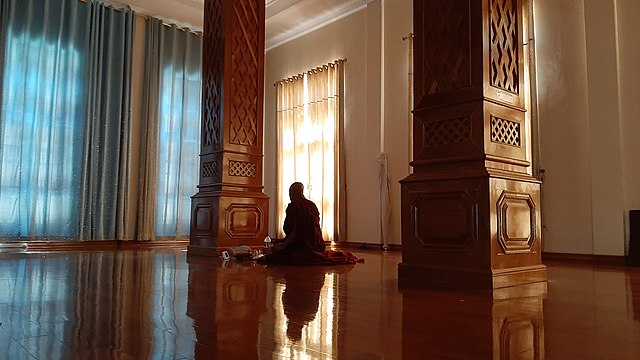TWH – Earlier this year, two studies examined the impact of breathwork on mental health. As many in our community are aware, breathwork is an integral part of many Pagan traditions as is heightened self-awareness of actions and mindfulness. Now experts are saying that these techniques might be helpful in managing high blood pressure as well.
During Pagan festivals and ritual spaces, many participants are introduced to breathwork, yoga, meditation, and mindfulness practices. Indeed, one central theme in many Witchcraft traditions is a self-reminder that “you are enough” and “all the power you need is within you,” the latter statement repeated in every episode by TikToker, Witch, and Covenant of the Goddess clergy, Andrea Joy (who can also be found at @cog_tiktoc)
Storm Faerywolf also mentions the personal impact of regular ritual practice and describes meditation as an important tool in his recent TWH article on The Magic of Regular Practice.

Pixabay
Previous studies have found that certain types of breathwork promote stress reduction. Researchers have noted that “People with stress and anxiety disorders tend to chronically breathe faster and more erratically, yet with increased meditation practice, respiration rate can become gradually slower, potentially translating into better health and mood, along with less autonomic activity.” Breathwork alone, as researchers have hypothesized, might not only lower nervous system excitation but also bring about a release of endorphins, neurotransmitters that are released by the brain that act as natural painkillers and can also produce feelings of euphoria.
Now, some of those findings might be extended to high blood pressure.
High blood pressure, or hypertension, is a leading cause of premature death worldwide. High blood pressure is often called a “silent killer” because it usually has no noticeable symptoms until it has caused significant damage. Regular blood pressure monitoring is crucial for early detection.
The Centers for Disease Control and Prevention (CDC) notes “Blood pressure is the pressure of blood pushing against the walls of your arteries. Arteries carry blood from your heart to other parts of your body.” High blood pressure, or hypertension, is a medical condition characterized by the force of blood against the walls of the arteries being consistently too high. Over time, “High blood pressure can damage your health in many ways. It can seriously hurt important organs like your heart, brain, kidneys, and eyes.”
Traditionally, and in addition to possible medication and regular contact with health professionals for advice, experts like those at the CDC recommended lifestyle changes to reduce the threat of high blood pressure. Those include:
- Getting at least 150 minutes of physical activity each week (about 30 minutes a day, 5 days a week)
- Not smoking
- Eating a healthy diet, including limiting sodium (salt) and alcohol
- Keeping a healthy weight
- Managing stress
Specific recommendations around the latter, “Managing Stress,” however, have been generally vague. The CDC, for example, has contextual support material such as managing stress in relation to diabetes or in work settings.

Senior Monk in Meditation, Myanmar [Photo Credit: Bks07 CC BY-SA 4.0]
This past week, in the Journal of Hypertension, a panel of experts from 18 countries in association with the International Society of Hypertension, the European Society of Hypertension, and the World Hypertension League added mindfulness practices as a recommended lifestyle goal. The panel wrote, “There is undeniable need to change our current standards of lifestyle approach, such as an integral treatment of hypertension patients.”
The updated lifestyle goals are related to maintaining health stress levels and now include:
- Improve sleep hygiene and increase quality sleep time;
- Practice sleep stimulus control methods;
- Promote mindfulness/stress reduction practice;
- Consider meditation/yoga/breathing techniques;
- Consider music therapy/self-soothing techniques/gratitude/acts of kindness.
The panel of experts noted that “In recent years, mindfulness practices, defined as the awareness, including self-understanding, wisdom and compassion that comes from intentionally focusing on the present moment, have received interest as an alternative approach for the treatment of chronic diseases.
They added, “The mindfulness-based stress reduction (MBSR) program has been demonstrated to have a broad efficacy in improving physical and mental wellbeing, as well as promoting office BP reduction.”
They recommended 30 minutes of meditation practice daily or 45 minutes of yoga along with mindfulness techniques that include gratitude and kindness.
The panel went further and noted the intersectional nature of stress including the impact of urbanization and the consumption of highly processed foods. Previous research has pointed to the mental health effects of green spaces and there is growing concern among scientists and health professionals about the impact of ultra-processed foods.
Many Pagan traditions have long known about ways to promote mind-body connectivity and healing. Perhaps more importantly, as our community knows, the practice of these techniques can be easily taught and mastered to help others. To quote Andrea Joy again, “As a human you have access to the power you need.”
The Wild Hunt is not responsible for links to external content.
To join a conversation on this post:
Visit our The Wild Hunt subreddit! Point your favorite browser to https://www.reddit.com/r/The_Wild_Hunt_News/, then click “JOIN”. Make sure to click the bell, too, to be notified of new articles posted to our subreddit.